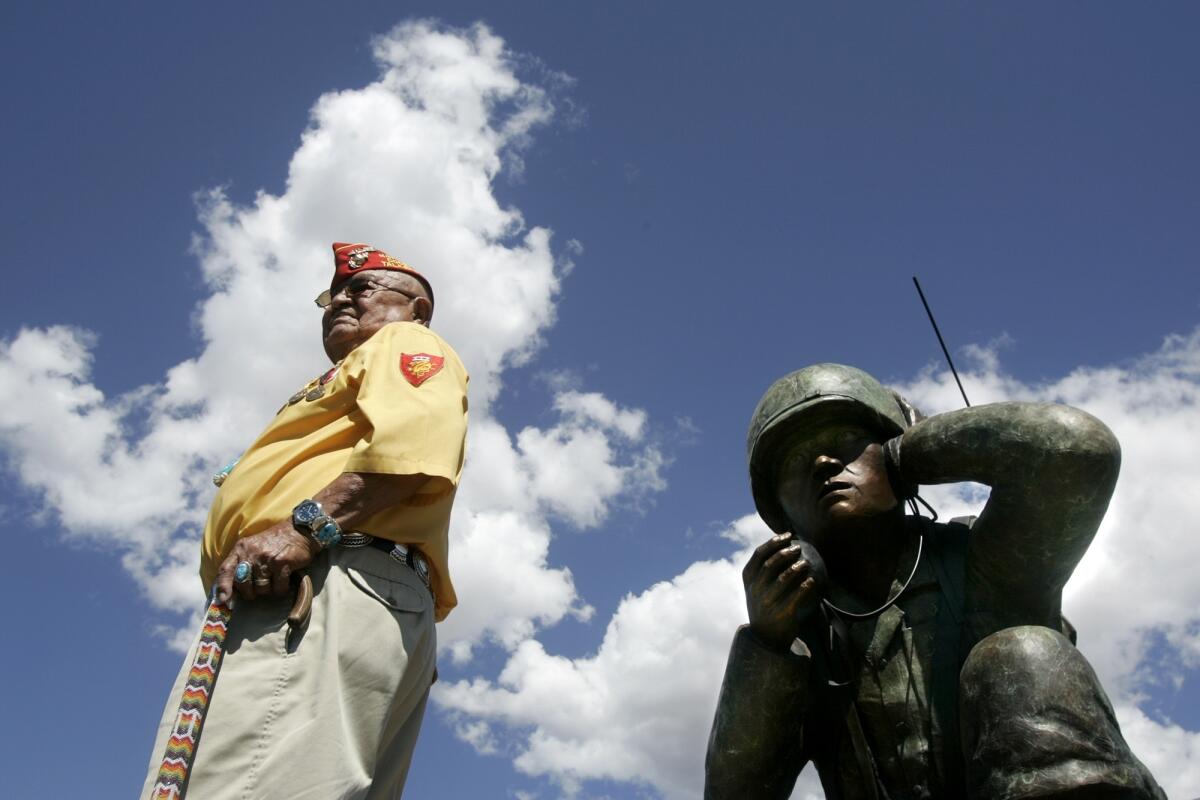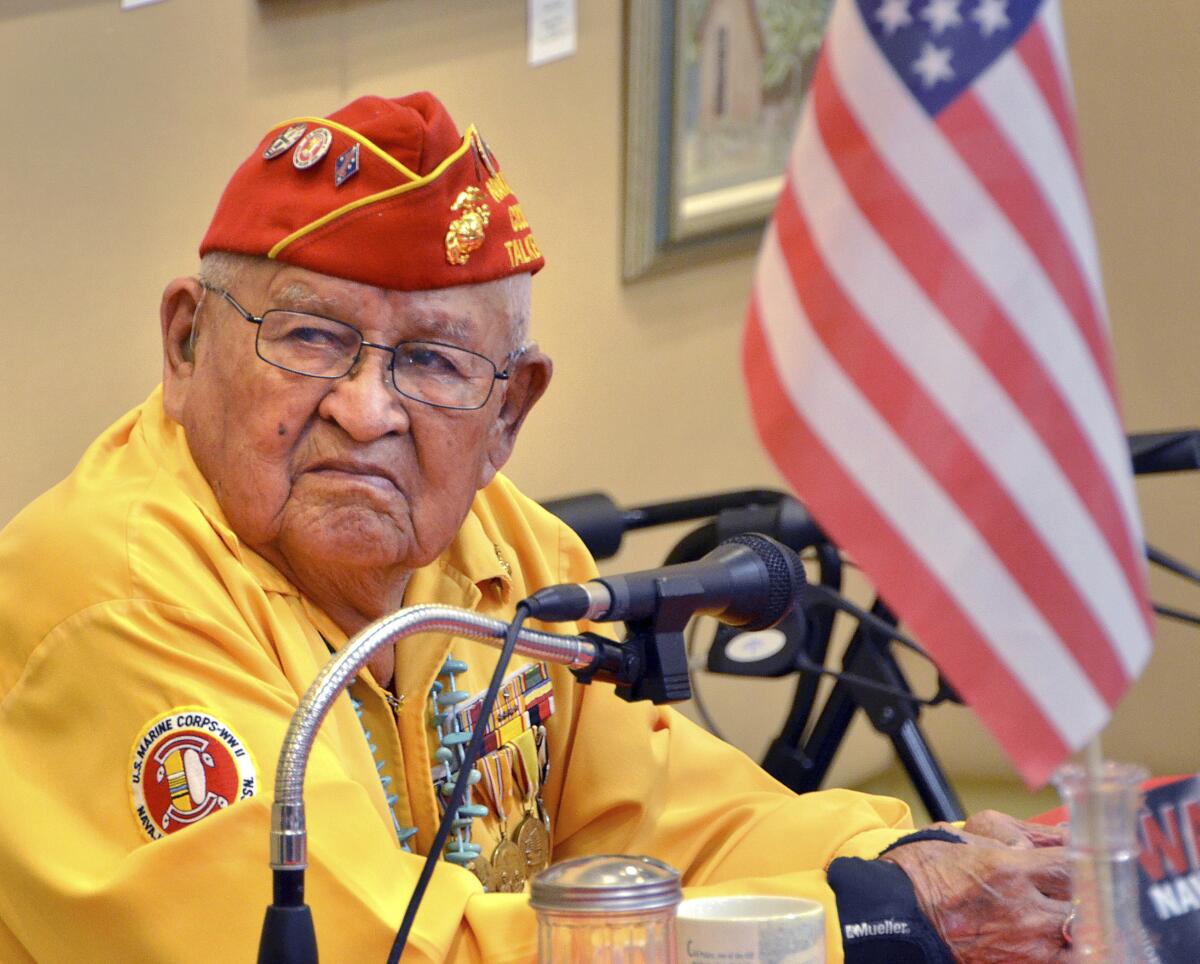Samuel Sandoval, one of the last World War II Navajo code talkers, dies at 98

Samuel Sandoval, one of the last remaining Navajo code talkers who transmitted messages during World War II using a code based on their native language, has died.
Sandoval died late Friday at a hospital in Shiprock, N.M., his wife, Malula, said. He was 98.
Hundreds of Navajos were recruited from the vast Navajo Nation to serve as code talkers with the U.S. Marine Corps during the war. Only three are still alive: Peter MacDonald, John Kinsel Sr. and Thomas H. Begay.
The code talkers took part in every assault the Marines conducted in the Pacific, sending thousands of messages without error on Japanese troop movements, battlefield tactics and other communications crucial to the warâs ultimate outcome.
The code, based on the then-unwritten Navajo language, confounded Japanese military cryptologists and is credited with helping end the war. About 540 Navajos served as Marines and approximately 400 of them were trained as code talkers.
Sandoval was on the Japanese island of Okinawa when he got word from another Navajo code talker that the Japanese had surrendered and relayed the message to higher-ups.
The Navajo men are celebrated annually on Aug. 14. Sandoval was looking forward to the upcoming celebrations and seeing a museum built near the Navajo Nation capital of Window Rock, Ariz., to honor the code talkers, his wife said.
âSam always said, âI wanted my Navajo youngsters to learn. They need to know what we did and how this code was used and how it contributed to the world,ââ his wife said. âThat the Navajo language was powerful and always to continue carrying our legacy.â

Sandoval was born in Nageezi near Chaco Culture National Historical Park in northwestern New Mexico. He enlisted in the Marine Corps after attending a Methodist school where he was discouraged from speaking Navajo. He helped recruit other Navajos from the school to serve as code talkers.
Sandoval served five combat tours and was honorably discharged in 1946. The code talkers had orders not to discuss their roles â not during the war and not until their mission was finally declassified in 1968.
The roles later became an immense source of pride for Sandoval and his late brother, Merrill Sandoval, who also was a code talker. The two became talented speakers who always hailed their fellow Marines still in action as the heroes, not themselves, said Merrill Sandovalâs daughter, Jeannie Sandoval.
âWe were kids, all growing up and we started to hear about the stories,â she said. âWe were so proud of them.â
Sandoval was curious, always reading the local newspapers and attending community, veterans, code talker and legislative meetings. He enjoyed traveling and sharing what he learned, grounded in the Navajo way of life, said one of his daughters, Karen John.
âIt was engrained early in me to be part of the community,â she said. âHe was really involved in a lot, some of which I couldnât comprehend as a kid.â
Sandoval often told his story, chronicled in a book and documentary of the same name â âNaz Bah Ei Bijei: Heart of a Warriorâ â at the Cortez Cultural Center in Cortez, Colo. Sandovalâs talks drew dozens of people, some of whom had to be turned away because of space limitations, said Rebecca Levy, executive director of the center.
âIt was a great opportunity for people who understood how important the Navajo code talkers were to the outcome of the war to thank him in person,â Levy said.
Sandovalâs health had been declining in recent years, including a fall in which he fractured a hip, Malula Sandoval said. His last trip was to New Orleans in June where he received the American Spirit Award from the National World War II Museum, she said. MacDonald, Kinsel and Begay also were honored.
Sandoval and his wife met while he was running a substance abuse counseling clinic and she was a secretary, she said. They were married for 33 years. Sandoval raised 11 children from previous marriages and in blended families, John said.
Navajo President Jonathan Nez said Sandoval would be remembered as a loving and courageous person who defended his homeland using his sacred language.
âWe are saddened by his passing, but his legacy will always live on in our hearts and minds,â Nez said in a statement.
More to Read
Start your day right
Sign up for Essential California for the L.A. Times biggest news, features and recommendations in your inbox six days a week.
You may occasionally receive promotional content from the Los Angeles Times.






